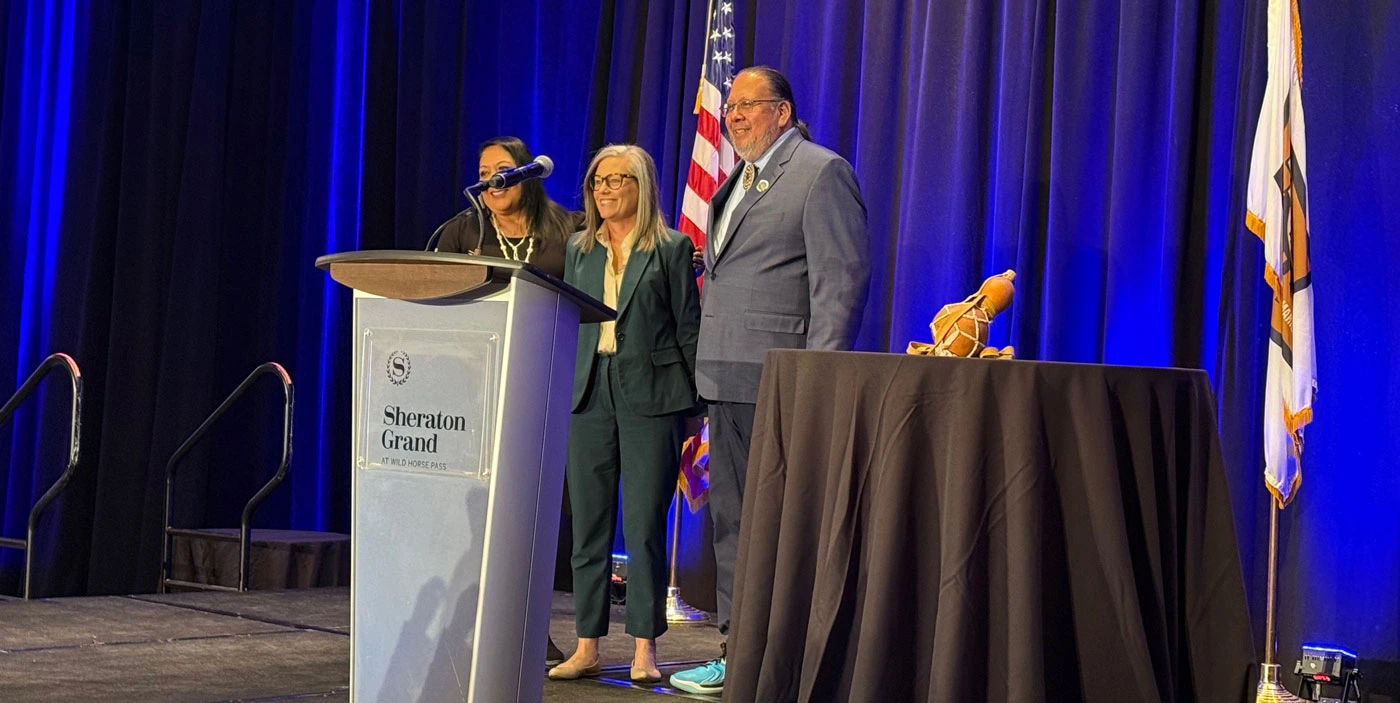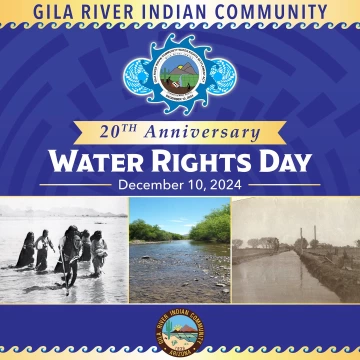
(L to R) GRIC Lt. Governor Regina Antone, AZ Governor Katie Hobbs, and GRIC Governor Stephen Roe Lewis. Image: Sharon B. Megdal

On December 10, I attended the 20th anniversary Water Rights Day celebration of the Gila River Indian Community Water Rights Settlement. The settlement, which was a key component of the Arizona Water Settlements Act of 2004, quantified the annual water budget for the Gila River Indian Community (GRIC) at 653,500 acre-feet. The inspirational comments shared by the stellar line-up of speakers at the celebration motivated me to write this end-of-year essay. Rather than end the year focusing on the negative or mixed messages of the prior week’s annual conference of the Colorado River Water Users Association (CRWUA), I choose to end this year with some positive messaging. Miss Gila River, Susanna Osife, who emceed the first portion of the 20th anniversary celebration, invited speakers to offer words of encouragement. In addition to the speakers and a great lunch, community multi-generational dancers performed and blessings were offered.
The program’s distinguished speakers included current elected leaders representing Tribes and Arizona, along with others involved in the settlement’s passage and/or implementation. GRIC Governor Stephen Roe Lewis emceed the second part of the program, which included his closing remarks. Speakers appeared in this order: Regina Antone, Lt. Governor, Gila River Indian Community; Carla Johnson, Vice Chair, Tohono O'odham Nation; Jordan Joaquin, President, Fort Yuma Quechan Indian Tribe; David DeJong, Director, Pima-Maricopa Irrigation Project; US Senator Mark Kelly (video); US Representative Juan Ciscomani (video); US Representative Greg Stanton (video); US Representative Reuben Gallego (video); Tom Buschatzke, Director, Arizona Department of Water Resources; Jon Kyl, former US Senator and US Representative; Brenda Burman, currently General Manager, Central Arizona Project; Katie Hobbs, Governor, State of Arizona; Mike Connor, most recently US Assistant Secretary of the Army for Civil Works; Richard Narcia, former Governor, Gila River Indian Community; and Stephen Roe Lewis, Governor, Gila River Indian Community.
I made note of several themes and concepts, many of which were mentioned by multiple speakers. Here is my list.
-
Water is Life.
-
Water is who we are.
-
Tribes have solutions. They are asking to be heard and be at the table.
-
Passion for listening and learning
-
Vigilance
-
Many tributes to the tenacity and leadership of Rodney (Rod) Blaine Lewis, which is being carried forward by his son, Governor Stephen Roe Lewis. Rod Lewis was a role model for many.
-
Trust was key to the process of getting to agreement on the settlement.
-
The work is not done, especially because of the drought.
-
Water is the anchor of GRIC’s future.
-
GRIC is a major player in Arizona water solutions.
-
GRIC has been a trusted partner.
-
Tribal partnerships are integral to our collective water security.
-
Leadership
-
Shared commitment
-
Hard work
-
Innovation, such as the solar over canal project, the first in the Western Hemisphere
-
Role of fierce and fair negotiations
-
Toughness but also generosity figures in.
-
Issues can be solved, even those that at times appear impossible.
-
Doing well for one’s community can be in the interest of others.
-
Investments in infrastructure are critical to accessing water and to protecting and realizing the value of the settlement.
-
The convener role is important.
-
Vision based on dreams for the people and their culture
-
Vision to move forward
-
Leadership, leadership, leadership
Here are some notes specifically on Governor Stephen Roe Lewis’ closing comments.
-
At this 20-year milestone, it is important to honor those who helped achieve the settlement and celebrate the Community’s accomplishments.
-
Water Rights Day is always a day of reflection.
-
He honors the memory and legacy of leadership of his father, Rod Lewis.
-
He honors the champions from within and outside the Community.
-
He honors GRIC’s water warriors.
-
He thinks about his father’s optimism that they would persevere and prevail.
-
Every Tribe has its own water journey and journey to justice.
-
The journey may need these three things: luck, allies, and commitment.
-
The water journey is ongoing; it never ends.
-
Tribal water rights must be protected and respected.
-
The current situation requires a continuing pursuit of more stable, long-term supplies.
Governor Lewis spoke only four days earlier at CRWUA, alongside Manuel Heart, Chairman of the Ute Mountain Ute Tribe, and Buu Nygren, President of the Navajo Nation. The panel, which appeared toward the end of the conference, also included messages of encouragement and optimism. I share this December 6, 2024, statement of Chairman Heart: “Change comes at the speed of trust.” Indeed, these words resonate with messaging from the Water Rights Day celebration. Trust is essential. Whatever the setting, trust and respect, along with some optimism, are necessary for our journeys to water resilience and security.
Congratulations to the Gila River Indian Community on its water achievements!

